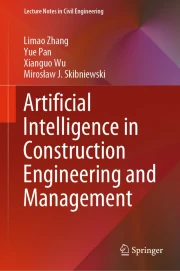
This is a preview of subscription content, log in via an institution to check access.
Softcover Book EUR 116.04
Price includes VAT (France)Hardcover Book EUR 158.24
Price includes VAT (France)Tax calculation will be finalised at checkout
This book highlights the latest technologies and applications of Artificial Intelligence (AI) in the domain of construction engineering and management. The construction industry worldwide has been a late bloomer to adopting digital technology, where construction projects are predominantly managed with a heavy reliance on the knowledge and experience of construction professionals. AI works by combining large amounts of data with fast, iterative processing, and intelligent algorithms (e.g., neural networks, process mining, and deep learning), allowing the computer to learn automatically from patterns or features in the data. It provides a wide range of solutions to address many challenging construction problems, such as knowledge discovery, risk estimates, root cause analysis, damage assessment and prediction, and defect detection. A tremendous transformation has taken place in the past years with the emerging applications of AI. This enables industrial participants to operate projects more efficiently and safely, not only increasing the automation and productivity in construction but also enhancing the competitiveness globally.

Dr. Zhang is currently an Assistant Professor at the School of Civil and Environmental Engineering (CEE), Nanyang Technological University (NTU), Singapore. He received his B.S., M.S., and Ph.D. degrees from Huazhong University of Science and Technology (HUST), China, in 2009, 2012, and 2014, respectively. Dr. Zhang’s research interests focus on Construction Automation, Artificial Intelligence, Building Information Modeling, and Infrastructure Resilience. He serves as the editorial board member of peer-reviewed journals, such as Automation in Construction, and Smart and Sustainable Built Environment. He has led research projects with up to 2 million Singapore dollars and has more than 90 papers published in peer-reviewed journals.
Yue Pan is currently a Ph.D. candidate at the School of Civil and Environmental Engineering (CEE) in Nanyang Technological University, Singapore. Her research interests include construction informatics, building information modeling, and data mining to support smart construction engineering and management. She received the M.S. of Civil Engineering from Carnegie Mellon University, USA, in 2017, where she was involved in the group of advanced infrastructure systems (AIS). She earned the B.S. of Engineering Mechanics from Tongji University, China, in 2016.
Xianguo Wu is Professor at the School of Civil and Hydraulic Engineering, Huazhong University of Science and Technology (HUST), China. Prof. Wu received the Ph.D. degree at HUST in 2006. Her research interests include tunnel construction safety, BIM, digital twin, and green buildings. She had led several projects funded by the National Natural Science Foundation of China (NSFC).
Dr. Skibniewski is A. James Clark Endowed Chair Professor of Construction Engineering and Project Management in the Department of Civil and Environmental Engineering at the University of Maryland in College Park.USA. Prior to his current appointment, he served for 20 years as a faculty member at Purdue University in West Lafayette, Indiana, where he held a position of Professor of Civil Engineering, Construction Engineering and Management. He received his M.Eng. degree from Warsaw University of Technology, and M.S. and Ph.D. degrees from Carnegie Mellon University. As a researcher and educator, Professor Skibniewski currently specializes in e-commerce technology applications to engineering project management for construction and in construction automation. Dr. Skibniewski served on the National Academy of Engineering USA-Germany and USA-Japan Frontiers In Engineering committees, American Society of Civil Engineers' Robotics and Field Sensing Committee, Information Technology Committee, and Intelligent Computing Committee, various technical committees of the Construction Industry Institute.